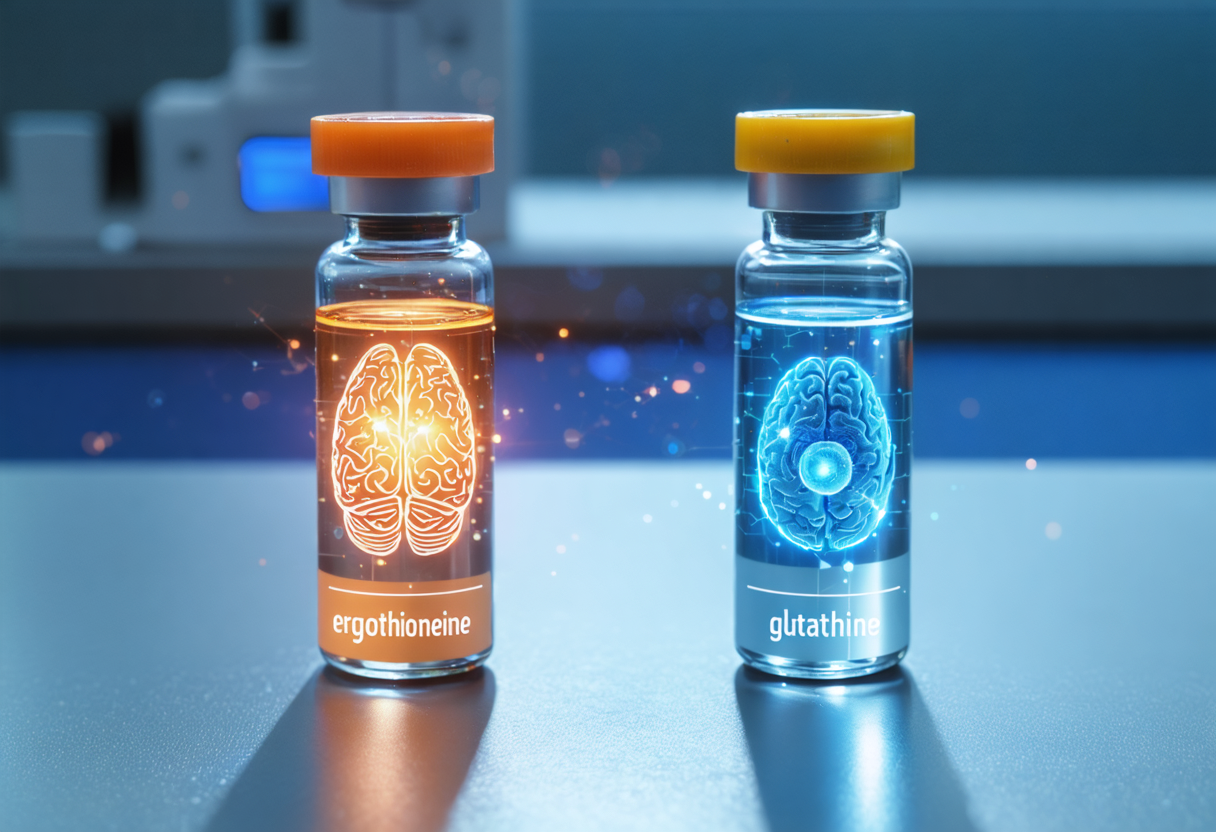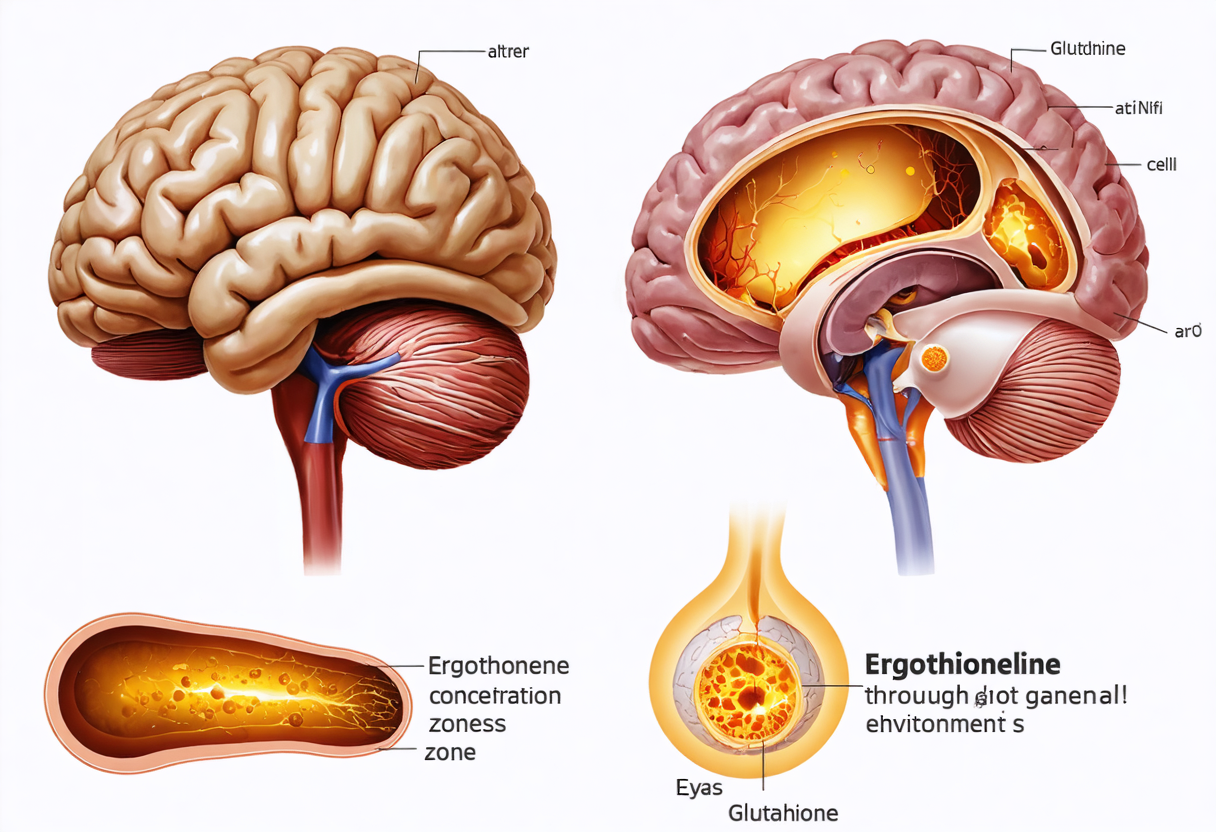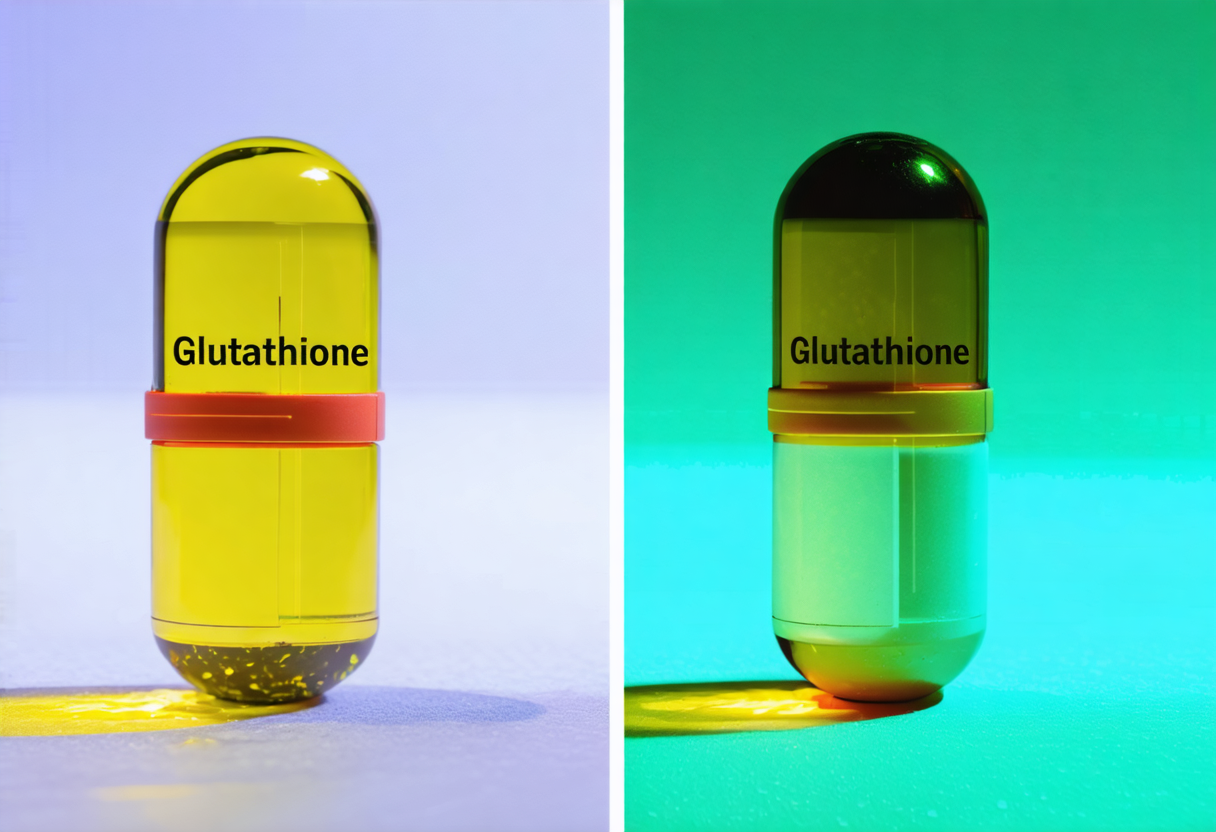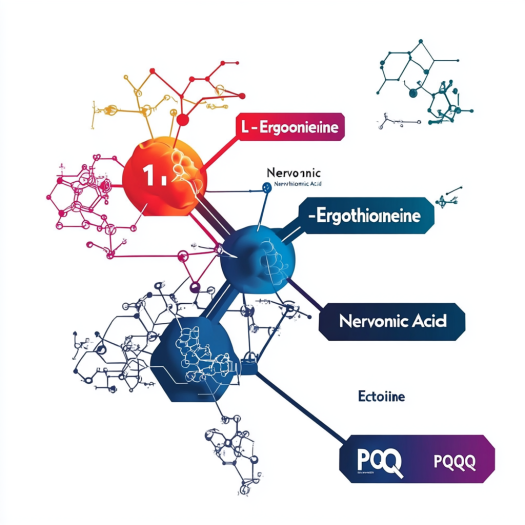
I used to believe glutathione was the ultimate antioxidant—until I came across ergothioneine.
Ergothioneine and glutathione are both powerful antioxidants, but ergothioneine has unique cell-targeting transporters, higher stability, and longer lifespan, making it potentially more effective in protecting long-lived cells like neurons and eye tissue.
What shocked me most wasn’t that ergothioneine is strong—it’s how precise and persistent it is.
What Are Ergothioneine and Glutathione, and Why Do They Matter?
Most of us don’t think about antioxidants until something goes wrong—foggy memory, tired eyes, skin that just doesn’t bounce back.
Glutathione is a self-made antioxidant in our cells, while ergothioneine is obtained through diet or supplementation, offering targeted protection especially in oxidative stress hotspots like the brain, liver, and eyes.

The Basics: Comparing the Two
Let’s break it down. Glutathione is like your body’s everyday janitor—it cleans up free radicals, maintains balance, and is present in nearly every cell. Ergothioneine, on the other hand, is like a specialized bodyguard stationed at high-risk zones.
Here’s a simple side-by-side:
| Feature | Glutathione | Ergothioneine |
|---|---|---|
| Source | Endogenously produced | Obtained from diet or supplements |
| Transport Mechanism | Passive diffusion | Active transport via OCTN1 |
| Tissue Concentration | Widespread | High in brain, eyes, liver, bone marrow |
| Stability | Rapidly oxidized | Highly stable and long-lasting |
| Primary Role | Detoxification, redox balance | Long-term antioxidant, cell protector |
| Lifespan in Cell | Short (minutes to hours) | Long (days to weeks) |
The presence of a dedicated transporter (OCTN1) for ergothioneine shows how much the body values it—it’s the only antioxidant we know of with this kind of delivery system.
How Does Ergothioneine Protect the Brain Better?
This hit home for me when a friend’s father was diagnosed with early-stage Alzheimer’s. It made me dig into everything I could about neuroprotection.
Ergothioneine accumulates in brain tissue, especially in regions vulnerable to oxidative stress, supporting mitochondrial health, reducing neuroinflammation, and slowing cognitive decline.
Brain Fog, Meet Your Match
Neurons are particularly delicate. They consume a lot of oxygen, and with that comes a barrage of free radicals. Glutathione tries its best—but it doesn’t always get where it’s needed most.
Ergothioneine is different. Thanks to OCTN11, it gets into brain cells directly, concentrates where stress is high, and sticks around. Studies have even found lower ergothioneine levels in people with cognitive decline.
Here’s how it works:
- Protects mitochondria, the energy generators of brain cells
- Lowers inflammation markers like IL-6 and TNF-α
- Prevents neuronal apoptosis (cell death)
In essence, it guards your mental sharpness. And in today’s always-on, screen-filled world, that’s a big deal.
👉 Dive into our ergothioneine raw material to explore how we help build brain-supporting products for supplement brands.
Which Antioxidant Is More Stable Under Stress?
Let’s say you’re running a marathon—or just living through a stressful work week. Your cells are under siege.
Ergothioneine is remarkably stable in the face of heat, UV, and oxidative stress, maintaining its antioxidant power longer than glutathione.

Why Stability Matters
Here’s a fun analogy. Think of glutathione as a disposable umbrella—it works, but breaks easily in a storm. Ergothioneine? It’s a storm shelter.
It resists breakdown, keeps working through harsh conditions, and is not quickly used up like glutathione. That makes it ideal for:
- Eyes, exposed to UV light all day
- Skin, constantly fighting environmental stress
- Liver, battling toxins and inflammation
And because it’s not self-produced, your body stores it long-term. That’s why we often see it building up in tissues over time—providing lasting protection.
Can They Work Together? Or Should I Pick One?
If you’re like me, you might wonder—should I switch from glutathione to ergothioneine?
Ergothioneine and glutathione complement each other. While glutathione manages short-term detox and redox cycles, ergothioneine supports long-term stability in vulnerable tissues like neurons, eyes, and immune cells.
Tag Team in the Antioxidant Ring
They aren’t rivals—they’re partners.
Glutathione does quick clean-up work, recycling oxidized molecules and neutralizing toxins. Ergothioneine plays the long game, protecting key cells from slow degeneration.
In fact, some formulations combine them:
- Glutathione + Ergothioneine capsules for anti-aging
- Functional powders for liver detox + cognitive support
- Skin creams that pair them for UV and pollution protection
| Use Case | Glutathione Role | Ergothioneine Role |
|---|---|---|
| Cognitive Health | Detox and inflammation | Mitochondrial stability |
| Eye Protection | General antioxidant | UV and retina defense |
| Skin Defense | Glutathione recycling | Deep layer cell repair |
| Liver Health | Detoxification | Oxidative stress buffer |
One isn’t “better”—they just shine in different ways.
Is Ergothioneine a Better Fit for Aging and Long-Term Wellness?
Now, this is where things get personal. As I hit my 40s, I started thinking differently about health. I wasn’t chasing quick fixes anymore—I wanted something that would last.
Ergothioneine offers deep, long-lasting support in tissues most affected by aging, including the brain, eyes, joints, and immune system, making it a promising longevity nutrient.
Not Just About Years—It’s About Quality of Life
What I love about ergothioneine is its gentle persistence. It doesn’t spike, crash, or disappear after a few hours. It’s stored in your cells, calmly doing its job every day.
Several studies link it to:
- Better mobility in aging adults
- Slower macular degeneration
- Reduced inflammation in joints and skin
And it’s safe. We’re talking GRAS status in the U.S., and approved in the EU, Japan, Korea, and beyond. No toxicity, no side effects—even at higher doses.
Our version? Pure, third-party tested, naturally fermented—check it out here.
Why We Recommend Ergothioneine to Our Clients
If you’re formulating a product for longevity, clarity, or resilience, this is where ergothioneine shines.
We help brands create capsules, powders, and functional blends with ergothioneine that serve modern consumer needs—especially in cognitive, eye, and anti-aging spaces.
Here’s what most clients love:
- Capsules for brain support (5–10 mg daily)
- Powders for energy and anti-fatigue
- Skincare serums with cellular antioxidants
And since it’s heat- and pH-stable, it’s flexible. You can add it to hot drinks, gummies, shots—whatever suits your market.
| Format | Popular Use Case |
|---|---|
| Capsules | Brain, vision, immune support |
| Powders | Energy, focus, aging formulas |
| Gummies | Eye health, youth-focused brands |
| Creams & Serums | Sensitive skin, UV protection |
We’re even exploring eye drop formulations and nasal sprays. That’s how promising this molecule is.
Conclusion
Ergothioneine isn’t just powerful—it’s precise, persistent, and perfectly tuned for protecting what matters most.
-
Understanding OCTN1’s function can reveal how Ergothioneine effectively reaches brain cells, enhancing cognitive health. ↩

